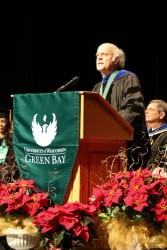
A faculty member with a national reputation as an author, historian, and political analyst rallied UW-Green Bay’s fall/winter 2015 graduates to do their patriotic part to rediscover American democracy and make the nation “freer, more equal, and more democratic than ever before.”
Commencement speaker Harvey J. Kaye, a UW-Green Bay professor of Democracy and Justice Studies, addressed a capacity audience of more than 2,000 students, friends, families, faculty and staff Saturday afternoon (Dec. 19) at the university’s Weidner Center for the Performing Arts.
The nearly 400 graduates participating in the ceremony, seated directly in front of the stage, gave Kaye a standing ovation at the conclusion of his enthusiastic challenge.
“Traditionally, commencement speakers call on graduates to embrace the future,” Kaye had said earlier, in introducing his topic. “But I’m going to call on you to do something else: I am going to urge you to embrace the past. I want you to remember who you are, and who we are (as Americans).”
Kaye shared his perspective as historian and author of two well-received biographies of Revolutionary War firebrand Thomas Paine, along with The Fight for the Four Freedoms: What Made FDR and the Greatest Generation Truly Great (Simon & Schuster, 2014).
He began his talk by outlining a host of problems facing today’s graduates and America’s next generation of leaders. A proud progressive activist, Kaye cited as serious threats: industrial decline, economic inequality, what he views as the widespread elevation of private gain over the public good, backsliding on the environment, and “devastating and too often deadly assaults on the rights of workers, women, and people of color.”
The challenges are great, Kaye acknowledged, but their severity is hardly unprecedented in American history and, he told the graduates, he expects them to rise to the opportunity.
“Bluntly put,” Kaye said, “It is time for you to make history as our greatest generations have made history.
“It is time for you and your generation to transform this nation as generations of Americans did in the 1770s, the 1860s, the 1930s and 1940s… not to mention the 1960s.”
Kaye then recited touchstone statements of liberty, equality and freedom:
- Thomas Paine’s argument in his revolutionary pamphlet Common Sense, that “we have it in our power to begin the world over again”
- Thomas Jefferson’s phrases in the Declaration of Independence, that “all men are created equal… endowed by their creator with certain unalienable rights… among these are life, liberty and the pursuit of happiness”
- The Preamble to the Constitution: “We the people of the United States, in order to form a more perfect union…”
- Abraham Lincoln at Gettysburg proclaiming “a new birth of freedom” and insisting upon a “government of the people, by the people, for the people”
- FDR’s call in 1941 to create a nation and a world marked by four fundamental freedoms: “Freedom of speech and expression, Freedom of worship, Freedom from want, Freedom from fear”
- Martin Luther King Jr.’s stirring 1963 speech: “I have a dream…”
He mentioned how the American colonists of the 1770s rejected kings and aristocrats and created their historically unprecedented democratic republic. In the 1860s, citizens sustained the Union. In the 1930s, working men and women mobilized not only to rebuild the economy but to reform government and fight for civil rights.
His parents’ generation, Kaye recalled, beat fascism by turning the USA in the Arsenal of Democracy, sustained that effort to prevail in the Cold War against the Soviet Union, “and made the United States the most powerful and prosperous nation in human history, and created the American middle class.”
In the 1960s, the Greatest Generation followed all that — “when challenged by their own children to live up to the promise for which they had fought” — by enacting the Civil Rights and Voting Rights acts, liberalizing immigration, creating Medicare for the elderly and Medicaid for the poor, and making positive change for the environment, workplace and marketplace.
Kaye was interrupted by applause when he noted the 1960s were a time when the nation made a major push to expand educational and cultural opportunities for all Americans, as exemplified in Wisconsin by the creation of UW-Green Bay, this year celebrating its 50th anniversary.
In recent years, Kaye argued, Americans have begun to forget — or worse, have been encouraged to forget — this nation’s history as an egalitarian-minded society.
Said Kaye, “Whether you are liberal or conservative, you can see the time has come to act as the greatest Americans of the past have acted in the face of mortal crises. It is time to get up, harness the powers of government, and dramatically – indeed, radically – enhance American democratic life.”
Kaye teaches courses in history, politics, and society. Since joining the University in 1978, he has steadfastly championed the liberal arts and UW-Green Bay’s brand of interdisciplinary, problem-focused education. He founded the Historical Perspectives Lecture Series in 1985 as a way to personally introduce his UW-Green Bay students and others to leading thinkers in their fields.
Kaye is a two-time winner of UW-Green Bay’s Founders Award for Excellence and a recipient of the Ben and Joyce Rosenberg Professorship.


